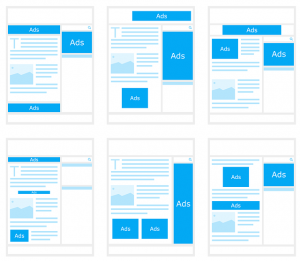
Visitors perception of your website?
Successful websites, in other words – sites that receive lots of relevant traffic, incorporate measured amounts of white space to:
- Ensure legibility & readability
- Enhance attractiveness & professional image, and
- Solidify brand awareness
- Promote conversions
Cross Industry Tips
White space is any space that isn’t occupied by other visible elements. This can be the space between characters, words, lines, paragraphs, images, and sections of your website. Whereas the direct mail industry leans to big, bold and in-your-face (minimal white space) because that’s what works for them, this strategy doesn’t work well for desktop websites. On mobile sites, Google actually looks for ample space between hyperlinks. Why? Fat thumbs! Ensuring that your website is easily navigable is huge.
 The newspaper industry has a term called “above the fold.” I used to be newspaper reporter (long ago), for a small weekly published in Pensacola, FL. In terms of value, everything on the front page was gold. Who wants their story buried 6 pages back? Websites share that dilemma as well. Everything displayed without scrolling gets seen first, and of course first impressions leave lasting impressions.
The newspaper industry has a term called “above the fold.” I used to be newspaper reporter (long ago), for a small weekly published in Pensacola, FL. In terms of value, everything on the front page was gold. Who wants their story buried 6 pages back? Websites share that dilemma as well. Everything displayed without scrolling gets seen first, and of course first impressions leave lasting impressions.
White space balance
While a large part of the battle is just getting prospects to your site, the next battle is keeping them there. If you use too little white space, your site may appear cluttered, and too much white space, seem empty. White space is an important facet of a website’s design, as it compliments your site’s content, helping to emphasize your products or services.
 White space helps navigation
White space helps navigation
Active white space, or white space that’s intentionally added, can help visitors to your site navigate easier, by providing structure for your navigation bar, content, header, and footer. Content that is structured and follows a predictable pattern throughout your site helps visitors find the information that brought them to your site from search queries or other marketing strategies.
Passive white space, on the other hand is not so clearly defined. Some say it’s the product of poor layout design. Others contend it’s more about modifying space to improve the readability of your content – type family, letter spacing, line length and leading (space between the lines). These directly tie into readability and legibility.
Readability and legibility
You can have the best, well thought out and researched content, but if it’s not easily readable, your visitors will move on to other sites. If your selection of color schemes – font versus background colors clash, your visitors will move on to other sites. If you write in long unbroken blocks of text, your visitors will …. you get the point!
 How does white space brand your product or service?
How does white space brand your product or service?
Hard copy newspapers are expected to have dense content, but they still need to be readable. Websites, on the other hand, need an industry specific blend or balance of white space. Generally, the more upscale your product is, more white space is used to portray its value. Overlaying images of products on your website with cluttered or in-your-face bold text diminishes the perception of its value.
A number of developers either design their sites around SEO narratives or facts & figures. The end goal of business sites really is about either branding or conversions, so perception is the key element. First, your site needs to be perceived as professional, current, value add and have an effective call to action. For all of that to happen, it needs to be readable and eye catching.
My Recommendation
First, research what your competitors are presenting online. Why? Because your visitors either just came from their site, or will visit their site after leaving yours. Comparison shopping on the Internet has never been easier.
What will set your site apart, aside from your Unique Selling Proposition (USP)? Optimizing your site for the right balance of white space may not seem important, but image or the perception of value is so much more important than it used to be.
Selling on price alone rarely works long term. Branding your business image helps you own your niche in the industry.

BROUGHT TO YOU BY PROLIMEHOST
We’ve been in the web hosting industry for over a decade, helping hundreds of clients succeed in what they do best and that’s running their business. We specialize in Virtual Private Servers (VPS) and dedicated servers, with data centers in Los Angeles, Denver & Singapore.
VPS SERVICES: LIGHTNING FAST SSD VIRTUAL SERVERS
Our Virtual Private Servers all feature high performance Xeon processors and SSD storage in a RAID10 configuration to optimize your server’s performance, which dramatically enhances visitor experiences on your site.
That speed is backed by unparalleled 24/7 support, featuring both outstanding response AND resolution times to maximize your uptime.
Now is the time to join the ProlimeHost virtual private server revolution.
DEDICATED SERVERS: BACKED BY A 99.9% SLA NETWORK UPTIME GUARANTEE
We only use enterprise-class hardware in our dedicated servers and offer a four (4) hour hardware replacement. Throw in IPMI for remote management, support for public and private networks, free operating system (OS) re-installs, and SATA, SAS & SSD (including NVMe) storage. Call 1-877-477-9454 or contact us. For everything from gaming, AMD and GPU servers to cheap dedicated servers, we’re here to help.
ASIA OPTIMIZED SERVERS: IMPROVING CONNECTION SPEED AND QUALITY
Procuring an Asia optimized server improves the connection speed and quality between the server and the users in Asia or China. This can reduce latency, packet loss, jitter, and bandwidth issues that can affect the performance and reliability of the server and the applications hosted on it. For more information, please call 1-877-477-9454 or contact us.
- Increase Your Online Sales | Some Tips - July 2, 2025
- Overstock USA Dedicated Server Sale, Over 300 servers on SALE at Dirt Cheap price!! - June 30, 2025
- Five Additional Ways to Use Your VPS - June 27, 2025


